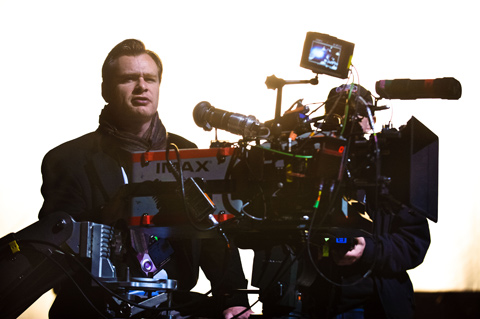LOS ANGELES — More than your average comic-book-hero movie — Green Lantern (2011) and Fantastic Four (2005) come to mind — Christopher Nolan's Batman trilogy has demonstrated an uncanny political insight and prescience. Batman Begins (2005) explored a world of terror and chaos not unlike the aftermath of 9/11. The Dark Knight (2008) delved into the War on Terror's consequences: repression, the manipulation of fear to attain power, the abuses of governmental secrecy.
>> REVIEW: The Dark Knight Rises <<
In the third and final film, The Dark Knight Rises, Nolan confronts economic inequity and class warfare. And when he went to shoot scenes last October in New York City, it was as if the movie had leaked into the real world. One of the locations was blocks away from the Occupy Wall Street demonstration at Zucotti Park. How was this possible? At the press conference promoting the film in Los Angeles, members of the cast and crew offered their opinions.
Christian Bale, who portrays Batman for the third and maybe last time, found the whole thing kind of creepy. "There's something that I've always found uncanny about Chris [Christopher Nolan]," he said. "His ability to make good movies very topical. He had no way of knowing it [the Occupy demonstration] was going to happen when he wrote the script and when we started. But by the time it was happening I was looking at him going, 'What the hell? How did you know?'"
Maybe, Bale suggested, the precognitive power comes not so much from the filmmaker as from the Batman myth itself. "Bob Kane created this character in 1939, the beginning of World War II," he speculated. "It was an answer to the uselessness that individuals felt against this humongous tragedy. That's how Batman began. There's been wonderful spoofs [since then]. But [Batman] began as a very topical character. I think Chris returned it to that."

UNOCCUPIED Director Nolan had no intention of capturing an hisotorical moment. |
Nolan, however, denied having any intention of capturing the historical moment in his films, or including any political subtext. "To be perfectly honest," he said, "we tried to resist, even at the script stage, being drawn into specific themes, specific messages. These films are about entertainment, about story and character. But we try to be sincere about things that frighten us or motivate us. Threats to the civilization that we take for granted, our fears of evil. But these resonances come about as a result of us just living in the same world as everyone else and constructing scenarios that move or terrify us."
The resonances also come from a scenario written about 150 years ago by Charles Dickens. "At some point we started thinking about A Tale of TwoCities," acknowledged Jonathan Nolan, Christopher's brother and co-screenwriter. "It was a harrowing portrait of a civilization that had completely fallen to pieces. The terrors in Paris of that period [the French Revolution] — it's not hard to imagine that things could go that bad again."
Or go as bad as they do in The Dark Knight Rises, where gangs of the hoi-polloi hunting down members of the one percent resemble sans culottes carting off members of the French aristocracy.
Not to fear, though. As Christopher Nolan noted, it's only a movie: "You're dealing with a heightened reality. You're dealing with Gotham City. That gives you an interesting world to play with in a very operatic way. It's about myth-making, about offering Batman as a of hope for people in a corrupt society."